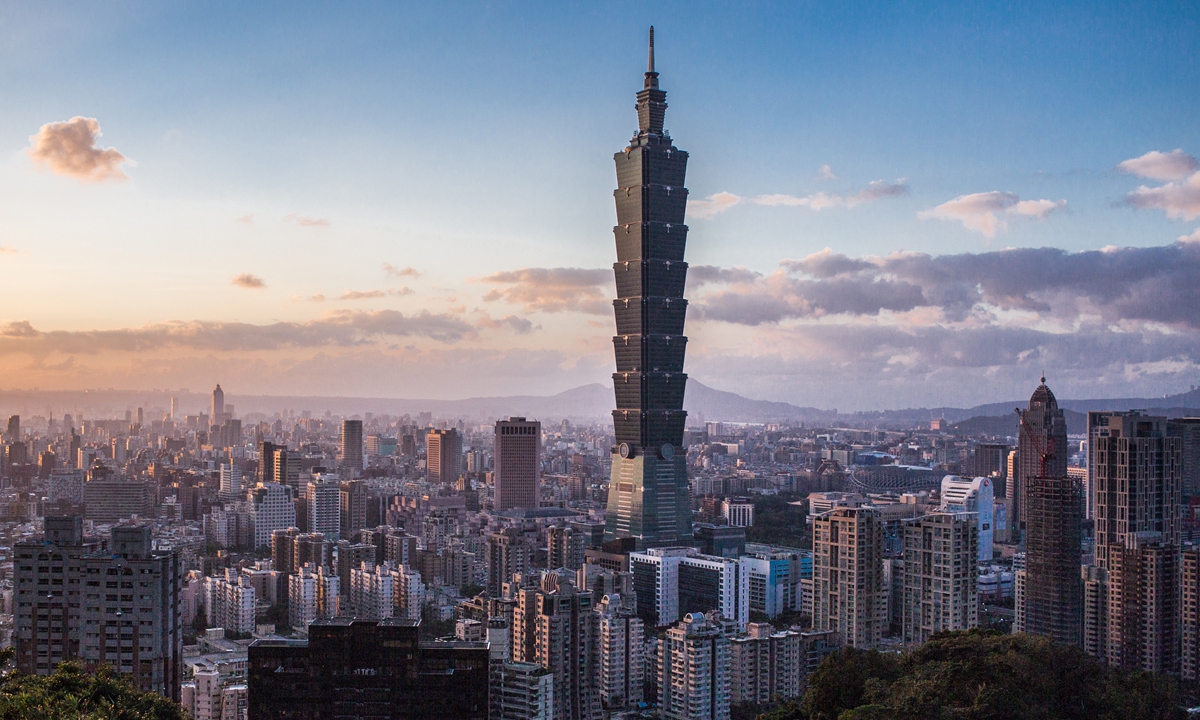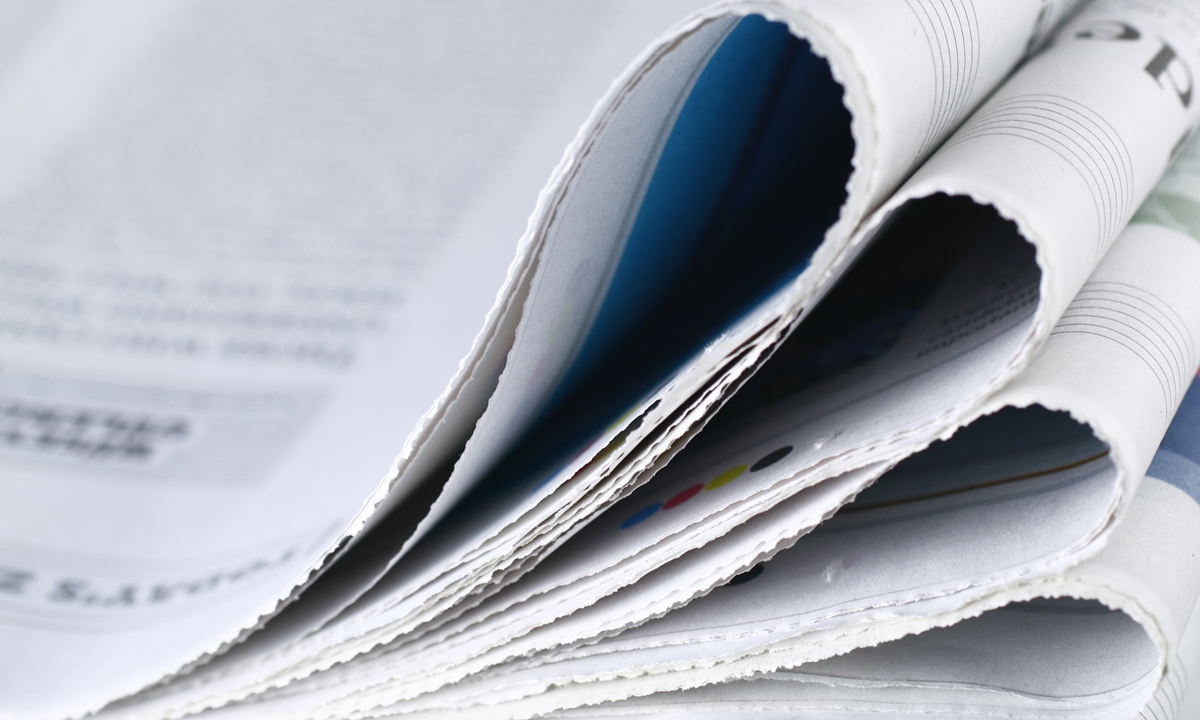IN-DEPTH / IN-DEPTH
Unveiling Liberty Times, DPP’s secessionist mouthpiece and bellwether
Dirty games

The view of Taipei Photo: VCG
"The Liaoning (aircraft carrier) lost power and was towed back to port." "People's Liberation Army on the India-China border cannot hold anymore." These are the typical sensational headlines created by Taiwan secessionist news outlet the Liberty Times.
Although the illusory and absurd reports such as "The imminent collapse of China," "The success of Taiwan secessionism" and "Tsai Ing-wen is the most beloved" were quickly debunked, the harm brought by this "media" house to Taiwan people and cross-Straits communication cannot be ignored.
Media insiders on the island of Taiwan told the Global Times that what the Liberty Times did was abhorrent in terms of journalistic ethics. As the media house has long played the role of "mouthpiece" of the secessionist Democratic Progressive Party (DPP) and a "bellwether" of secessionist statements, its top leaders should be added to the Chinese mainland's list of "diehard Taiwan secessionists."
Intertwined past with 'localists'
Founded in 1946, the predecessor of the Liberty Times was "Taitung Herald," which was a newspaper affiliated to the Kuomintang (KMT)'s Youth League Taitung branch. Due to the poor business operation, the newspaper changed ownership several times, and during the period, the Taitung Herald was renamed the "Yuandong Daily" and later the "Ziqiang Daily."
In April 1980, the "Ziqiang Daily" was sold to local politician and businessman Lin Rong-san, and changed its name to the "Liberty Daily," becoming the local newspaper in central Taiwan. In September 1987, it was renamed the "Liberty Times" and began actively expanding to the whole island.
Lin's taking over was the starting point of the developing of the Liberty Times, and Lin's "localist" political ideology was also an important reason for the newspaper to become an advocate for Taiwan secessionism.
Lin, born in the period of Japanese colonial rule in Taiwan, gained his fortune in real estate and construction. He and his two brothers set up three enterprises, and set up an influential politico-business group named "Sanchong gang," named after the Sanchong district of New Taipei city.
In the early years, few "waishengren," people from other provinces who came to Taiwan with KMT retreat, ventured into real estate because they were hell-bent on "counter-attacking the mainland and returning home." Therefore, most of those who started their real estate businesses in those days were the "local people" of Taiwan, whose idea was close to the "localists," Kuo Kuan-ying, a Taiwan-based writer who once worked at Information Office of the Taiwan authority, told the Global Times.
The Liberty Times suffered severe losses when it started its business, but Lin had amassed considerable wealth in real estate, so he distributed newspapers for free regardless of the cost, Kuo said.
According to an academic article by Jiang Xiaoyi from the School of Journalism and Communication at Xiamen University, the Liberty Times often spent money on promotion to gain readership. For example, in 1993, the Liberty Times initiated the "car, gold, and house" lottery promotion strategy, giving out 20 Mercedes, 100 Jeeps, and 1,000 motorcycles plus 300 kilograms of gold and several villas, to lucky subscribers.
"At that time, Taiwan had already begun to turn toward secessionism. It can be said that Lin 'bet on the right time,'" Kuo Kuan-ying, a Taiwan-based writer who once worked at Information Office of the Taiwan authority, told the Global Times.The Liberty Times changed its name from the Liberty Daily in September 1987. Just two months ago, on July 15, 1987, the then regional leader of Taiwan, Chiang Ching-kuo, from KMT, ended martial law in Taiwan, loosening political controls on opposing parties and newspapers, allowing the people to visit their family and relatives on mainland.
Lin is also surprisingly a member of KMT, which was regarded as a pan-blue camp, or a pro-reunification camp.
Kuo said that when the KMT began to "indigenize" 40 years ago, there were a number of Taiwan secessionists who joined it.
"Chiang once said, 'I am a Chinese and also a Taiwanese.' That sounds fine at first, but when you think about it more carefully, it sounds wrong because people in other parts of China don't say it that way… The deliberate emphasis shows that Chiang has begun to compromise with secessionists," Kuo said.
'It's really dreadful'
Advocating secessionism and being hostile to the Chinese mainland are the favorite subjects of the Liberty Times reports. Different from most other news outlets in Taiwan, the Liberty Times has been referring to the mainland as "China" or "the powerful country" in its reports. Since the COVID-19 outbreak, the media has stubbornly insisted on referring to COVID-19 as "Wuhan Pneumonia," in defiance of WHO guidelines. .
With most common titles like "China (mainland) glass-made heart is broken" and "Chinese netizens explode in anger", the general public impression of the Liberty Times is shoddy and low-brow. Tzou Jiing-wen, the editor-in-chief of the Liberty Times, recently used the headline "Dogs can't change their habit of eating excrement" to slander the mainland for "obstructing Taiwan's access to BNT COVID-19 vaccines."
Taiwan media outlet "China Times Weekly" once pointed out that Lin's political career was constantly controversial: He was accused of buying votes when he was elected to the "legislator" for the first time in 1975. Later, he ran for the position of head of Taiwan's investigatory authority, but was strongly reprised by academia and public opinion, and finally he was only elected as the vice head.
The Liberty Times' moves were rooted in its political stance; it is a staunch supporter of the line of Lee Teng-hui, Taiwan's former secessionist leader from the KMT.
On July 9, 1999, in an exclusive interview with German media, Lee openly claimed that cross-Straits relations are defined as "a special state-to-state relationship," which triggered a strong backlash from the mainland.
Ma Ying-jeou, the former Taiwan leader from 2008 to 2016, once told the media that the "two-nation theory" was an "operation in the black box," which no one knew, including Su Chi, leader of Taiwan's Mainland Affairs Council at that time, and Chen Chien-jen, the "head of news department" who accompanied Lee in the interview. "It does great harm to Taiwan."
Reviewing the history, Kuo said at that time, Su tried to retract the "two-nation theory," but Tsai Ing-wen encouraged Lee to make the expression clearer and "hit Su in the face."
Kuo said he was the first person to see the press release from Lee's office and realized the importance of this information, so he sent it to a senior reporter at the China Times.
Some foreign journalists thought that there would be a war across the Taiwan Straits, said Kuo, adding that Su later saw the statement and gathered foreign journalists together, hoping to rein in Lee from moving too far.
However, Tzou Jiing-wen from the Liberty Times published four articles in a row, bashing Su for offending Lee as a decision from the top have been made.
Tzou has writen many books that praised Lee, who often gave her "exclusive" information, and she gradually became the most appreciated reporter by Lee. After joining the Liberty Times in 1995, Tzou served as deputy director of its political center. Because of Lee Teng-hui, Tzou was given the green light to gradually rise to the rank of editor-in-chief.
"At that time, in the name of fighting for 'democracy and freedom,' some of the so-called KMT localists lured editors and reporters from United Daily News, the China Times, and other newspapers to the Liberty Times. Some of them, like Tzou, followed Lee and went further toward secessionism. Some with a sense of conscience have found it unacceptable as it violated the basic principles, so they left," Kuo said.
Su Heng, a pro-reunification media personality told the Global Times that Tzou is acting as DPP's thug. "Does her article really go into detail about the facts? No, it's all about emotions, and that's because people who read their papers want emotions."
"At press conferences, the journalists of the Liberty Times seldom ask questions, and even if they do, the questions are very simple. But when they go back to write the news, they will pick a negative perspective and turn it into an article that demonizes us. We don't usually deny them access to our press conferences, unless we feel their distortion has gone too far, and we call them to correct it, warning them of legal action. Usually they correct it, but it's published in no section prominent," Su said.
"It's really dreadful," Su said.

Photo: VCG
Added to diehard secessionists list
"There are too many examples of the Liberty Times playing the role of the 'bellwether' of secessionism rhetoric, sparing no effort to fabricate rumors," Kuo said, noting the newspaper also support rumors created by others.
They [The Liberty Times] are not ashamed when their fake news had been exposed, Kuo said.
As for Su Heng, the media personality, the Liberty Times acts as a mouthpiece for the DPP authority. "It acted as the DPP's PR, creating an illusion that Tsai is 'much loved by Taiwan people.'"
In June 2019, Taiwan's regional leader Tsai Ing-wen went to Taitung to solicit votes for reelection. She arranged to give a towel with the words "the country is great because of you" to a local student cycling team. However, the Liberty Times twisted the story into "the students presented Tsai the towel with the above words." Members of the cycling team immediately dismissed the fake news, saying Liberty Times tried to "paint them all green (pan-green camp)" without conscience.
When asking about the reason why such a media outlet "thrives" on the island, Kuo explained that the history of the Liberty Times evolution - first represented KMT's Youth League, then represented KMT localists, and finally as the mouthpiece of Taiwan secessionists - is in itself a symbol of the rise of Taiwan separatist forces.
"It is the mission of this newspaper to block cross-Straits information exchange, create fake news, and sell Taiwan secessionism with external forces as its back… and the people of Taiwan are the victims of their propaganda," Kuo said.
"I suggest the Chinese mainland should add the head of Liberty Times Lin Hong-bang and editor-in-chief Tzou to the list of 'diehard Taiwan secessionists.'" Su said.
Under the banner of "news media," secessionists like Tzou have imperceptibly infiltrated secessionism into every corner of Taiwan society, which is no less harmful than secessionist politicians.
"The Liberty Times now has a large circulation in Taiwan, more than China Times and United Daily News, and as soon as the news created by Liberty Times comes out, DPP's 'internet army' continues to spread it in a simpler and more efficient way," Su said.
Su added that many people who pursue secessionism in Taiwan do not have any pressure or cost, which makes them more unscrupulous in doing things that undermine cross-Straits relations.
Adding people like Tzou on the blacklist will let more secessionists know that their moves are being noticed across the Straits, even if they may not be on the frontline.
"The key is to hit them [secessionists] hard, whether they would be added into the list," said Kuo, "Essentially it depends on the mainland's strength."

